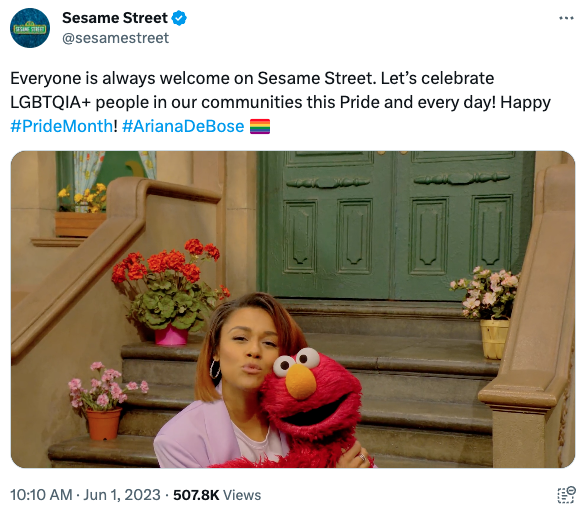
Budget & Tax, Culture & the Family
After Oklahoma veto override, Sesame Street touts transgenderism
June 20, 2023
Ray Carter
In April, Gov. Kevin Stitt vetoed legislation reauthorizing the Oklahoma Educational Television Authority (OETA), the state’s Public Broadcasting Service (PBS) entity. Stitt said the station does not need taxpayer subsidies to survive and noted much PBS programming for children now advocates for specific political stances in social-issue debates, including issues of sexuality.
But Republican lawmakers rushed to override Stitt’s veto on May 25, joining with liberal Democrats who provided the two-thirds margin required for the override. The veto override passed the Oklahoma House of Representatives on a 73-23 vote, and the Senate override passed 38-6. In the House, the success of the override attempt was greeted with cheers and applause from some lawmakers.
Within a week of the override, Sesame Street was touting transgenderism to children.
On June 1, Sesame Street released a video of the character Elmo declaring, “Happy Pride!” The accompanying tweet called for celebrating “LGBTQIA+ people in our communities.”

The T in LGBTQIA+ represents “transgender,” and Pride refers to “Pride month,” which highlights various sexual identities, including transgenderism.
On its Twitter account, Sesame Street issued similar messages on June 2, June 7, and June 12 with the June 12 tweet endorsing “freedom of authentic self-expression,” a phrase associated with transgenderism.

The fact that political activism on social issues has been embedded into children’s programming on PBS stations is one reason many lawmakers backed Stitt and opposed the veto override.
“That was one of the reasons why I voted to sustain the veto,” said state Rep. Kevin West, R-Moore. “When you’re having public funds being used to promote stuff like this, I think that’s highly inappropriate.”
“That’s the reason that I supported his veto from the very beginning,” said state Sen. Warren Hamilton, R-McCurtain.
At least 14 states do not provide direct state funding to their local PBS stations, a fact Stitt has noted.
Hamilton said it is false to claim OETA cannot exist without taxpayers footing the bill.
“Look at their list of donors and it will be a who’s who of rich, liberal elitists,” Hamilton said.
He also noted that OETA supporters claimed the subsidies must be maintained because OETA towers are used for emergency broadcasting. But Hamilton said funding to cover that cost could easily be provided to actual public-safety entities instead, such as the Department of Public Safety or Oklahoma Department of Emergency Management.
Stitt expressed disappointment in lawmakers’ action on the OETA bill, especially since so many lawmakers are self-proclaimed conservative Republicans.
“It’s unbelievable that conservative Republicans would override that bill,” Stitt said.
The governor said fiscal considerations were a major factor in his decision to veto, saying the state should not be operating a TV station, but he also said the political activism occurring in much PBS programming is also a huge concern.
“Using taxpayer dollars to get into these social issues, I’m just adamantly opposed to it,” Stitt said.
Ironically, many of the lawmakers who voted to override Stitt’s veto, and therefore indirectly supported continuance of children’s programming that touts transgenderism to children, had voted earlier in the session to ban sex-change surgeries and the provision of cross-sex hormones or puberty blockers to children who might be influenced by programming that touts transgenderism.
Hamilton said the mixed messages sent by lawmakers are the result, in part, of politicians engaging in power plays rather than policymaking.
“You got a bunch of people that want to show that they’ve got some power,” Hamilton said. “And so that’s a huge part of it.”
The state budget bill passed by the Oklahoma Legislature, which became law without Stitt’s signature, provided more than $2.8 million in state taxpayer funding to OETA.